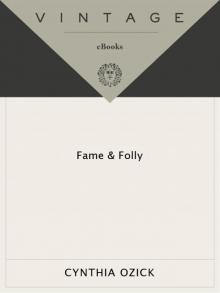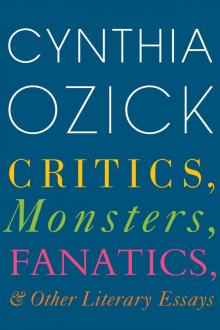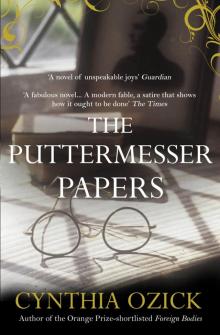- Home
- Cynthia Ozick
Dictation Page 3
Dictation Read online
Page 3
All around them there was the chink of cutlery, and a shaking out of mackintoshes, and the collective noise of mixed chatter, pierced now and then by a high note of laughter, and the pungent smell of wet wool. Miss Hallowes marveled: to have told that about Warren, how unlike herself it was! But Miss Bosanquet was taking it in without condemnation, and with all the naturalness and practiced composure of a nurse, or a curate; or even some idolatrous healer.
"I understand perfectly," Miss Bosanquet said. "Your mother can hardly have recovered from such a tragedy. She leans on you? She depends on you?"
"All that is true."
"And she has become your life?"
"Mr. Conrad is my life."
Miss Bosanquet bent forward; the hollows in her thin cheeks darkened; her thin shoulders hovered over her teacup. "We are two of a kind, Miss Hallowes. You with Mr. Conrad, I with Mr. James. In the whole history of the world there have been very few as privileged as you and I. We must talk more of this. I presume you are living with your mother?"
"I have a flat in the Blessington Road, but I often stop with her for days at a time."
"And how did you come to Mr. Conrad?"
"I was employed by a secretarial office, and he found me there. He seemed pleased with my work and took me on."
"My own beginning in a similar office was, I fear, a trifle more devious. I deliberately trained myself for Mr. James. Certain chapters of The Ambassadors were being dictated from a stenographer's transcription. I heard that Mr. James was dissatisfied and in need of a steady amanuensis, and I set myself to learn to type. It was a plot—I schemed it all. You will judge me a dangerous woman!"
"You are very direct."
"Yes, I am very direct. I think you must begin to call me Theodora. For a very few friends I am Teddie, but you may start with Theodora. And what am I to call you, Miss Hallowes?"
Miss Hallowes gave out a small worried cough. She hoped it did not mean she was catching cold. She said, "I'm sure it's time I ought to be off to my mother—"
"Please don't evade me. We have too much in common. We are each in an extraordinary position. Mr. James and Mr. Conrad are men of genius, and posterity will honor us for being the conduits of genius."
"I never think of posterity. I think only of Mr. Conrad, and how to serve him. The truth is—I am certain he is aware of it—he said it outright in a letter to Mr. Pinker, a letter that I myself typed—he is so often unconscious of me, he never realized—he told Mr. Pinker that were he to allow it I should work for him for nothing. And I should. Besides, Miss Bosanquet—"
"Theodora."
"—Mr. Pinker is also a conduit, as you put it. All Mr. Conrad's work passes through him."
"And Mr. James's as well. But Mr. Pinker is merely a literary agent. Mr. Pinker is secondary. He is in fact tertiary. No one in future will know his name, I assure you. It isn't Mr. Pinker who is blessed to listen to the breathings, and the silences, and the sighs, and the pacings ... sometimes, when Mr. James and I have been at work for hours, he will quietly place a piece of chocolate near my hand, and will even unwrap the silver foil for me—"
"There are occasions when Mr. Conrad is worn out at the end of the day and he and I sit in opposite chairs in his study and smoke. Mrs. Conrad doesn't like it at all."
"Smoke? Then you are an advanced woman!"
"Not so advanced as you, Miss Bosanquet—but you are very young and more accustomed than I to the new manners."
"Theodora. And I am past thirty. If by 'the new manners' you mean the use of our Christian names ... but look, our lives are so alike, we are almost sisters! It's unnatural for sisters to be so formal—have you no sisters?"
Miss Hallowes said gravely, "Only the two brothers, and one is dead."
"Then you will have a sister in me, and you may confide anything you wish. It's you who seem so young—have you never been in love?"
Miss Hallowes tried out her new little cough once more. It was not a cold coming on; it was recognition. Miss Bosanquet—Theodora—was entering a wilderness of strangling vines. In love? She believed, indeed she knew (and had declared it in Mrs. Conrad's hearing!), that Mr. Conrad's works were imprinted on her heart, and would remain so even after her death. The truth was she had loved him, mutely, for six whole years. Mr. Conrad never guessed it; he saw her, she supposed, as an enigmatically living limb of the Machine, and the operation of the Machine was itself enigmatic to him. But Mrs. Conrad, though simple and prosaic, had strong intuitions and watchful eyes, and ears still more vigilant. It had happened more than once that when Miss Hallowes and the family—it now included baby John—were at dinner, and if Miss Hallowes asked for the butter, Mrs. Conrad would turn away her head.
But she confessed none of this to, to ... Theodora.
She said instead, "You may call me Lilian, but please never Lily. And if you should ever write my name, you must write it with one l, not two."
"Then let me have your hand, Lilian."
Theodora reached over the sugar bowl and fondled the hand she had first touched on the other side of the Master's door. The palm was wide and soft and unprepared for womanly affection.
"Let us meet again very soon," she said.
***
When Lilian parted from her mother that evening, it was later than she had expected. She had stopped at a butcher's for lamb chops, a treat Mrs. Hallowes relished, and cooked them, and tried to turn the conversation from Warren. Her mother's plaints inevitably led to Warren, and then, predictably, to Lilian and the usual quarrel. Warren had been thirty-seven when he shot himself ("when he was taken," her mother said), exactly the age Lilian was now. To her mother this number was ominous. It signified the end of possibility, the closing down of a life. The dark fate of the unmarried.
"Thirty-seven! It's no good to be alone, dear, just look at your own poor mum, without another soul in the house. I'd be stone solitary if you didn't come by. And there you are, shut up all day long with that old man, and what future are you to get from it?"
"Mr. Conrad isn't old. He's fifty-three, and has young children."
"Yes, and don't I always get an earful, Borys and John, Borys and John. You talk as if they're yours, getting them presents and such. That'd be well and good if you had one or two of your own. Every year you've spent with Mr. Conrad is a year thrown to the winds. I truly think he's wicked, keeping you confined, using you up like that—"
"Mother, please—"
"It's not that I haven't looked into that book of stories you gave me this last Christmas, when what I really needed was a nice warm woolen muffler—"
"Mother, I gave you the muffler too, and a pair of gloves, don't you remember? And you've got your new tea cosy right there on the pot."
"—that wicked wicked Heart of Darkness, such a horrifying tale I never in my life could imagine. What must be in that man's mind!"
"It's a very great mind. Mr. Conrad is a very great writer. Posterity will treasure him."
Posterity. How improbable: that formidable word, how it sprang out in all its peculiar awkwardness, not at all the kind of thing that fit her mother's kitchen—the very word Miss Bos ... Theodora ... had uttered only hours before.
"Well, there you're right," her mother said. "The man has sons, that's the only posterity, if you want to say it like that, any normal person ought to care about. And when you lose one of your own, like our Warren—"
Her mother broke into weeping, and Lilian felt relieved; she was not callous, but she was used to her mother's tears, and preferred them to the subject of a marriage that would never be.
***
In her bed in the tiny flat in the Blessington Road, Lilian lay listening. She had hung a tall looking-glass on one wall to give the cell-like room an illusion of breadth, and from her pillow she could contemplate her reflection. She saw the white pillow behind her; she saw her head on the pillow. She saw her white face, dim in the half-dark, and (she fancied) ghostly. But she was not a ghost—she was ordinary flesh, as kneadable
as dough, a woman's body alone in a bed, with her hand on her breast. A woman's hand, which no one had ever stroked—only that evanescent grazing at Mr. James's door, and that oddly enthralling caress across the tearoom table. Theodora had taken her hand and turned it over and over, and then comically pretended to read her palm, like a gypsy seer; and then she plaited her own hand through Lilian's, and looked at her ... how to say it?—cannily, almost tantalizingly, as no one had ever looked at her before; as if some unfathomable purpose were pulsing between them. Out of her pillow voices were rising, known and perilous voices: all week she had labored beside Mr. Conrad, capturing the slow windings of the voices as they came twisting out of his viscera, or else hurtled out in violent tornado coilings, so that her fingers had to fly after them, rattling the Machine, rattling the lamps, rattling Mrs. Conrad's porcelain figurines. They were the very voices she had carried that day to the Reform Club—the heart of a tale still uncompleted, not yet named. The voices were in her ears, in her throat, in the whorls of her fingers. My double. My second self. My feeling of identity. Our secret partnership. My secret sharer. The voices shook her, they frightened her, and when Mr. Conrad broke off at last, she saw how spent he was. She too was spent. He took out his flint lighter and put it back in his pocket. He wasn't getting it right, he told her, not even the title, and who knew when the thing might be ready for print? He would not smoke now—he was flushed and sickly and untidy, as though he had been vomiting all afternoon.
She lifted her hand from her breast, and with her other hand delicately, tentatively tapped it, patted it, smoothed it, ran her fingers along the knuckles and under the yielding arch of the palm—just so had Theodora played with her hand in the teashop, making a toy of it, and then, then—raising it, smiling and smiling, as if about to put the curious plaything to her lips. That knowing smile, and the surprising small shudder that crept along her spine—a woman seeming almost to wish to kiss a woman's hand! It stirred and troubled her—the sensation was so much like ... that moment once, or moments, when, turning too hastily from the Machine to pass the day's sheaf of typed sheets to Mr. Conrad, a flurry of papers slipped from her, loosed and strewn, landing on the carpet, the two of them plucking and stooping and kneeling ("a pair of coolies in a rice paddy," he growled), their heads close and their hands entangled ... The ends of his fingers were hard, and the veins in his wrists were thin blue ropes under her eyes: a sailor's worn claw, and the unforeseen movement of it, its gritty touch, rocked her and affected her with a kind of thirst. And there was Mrs. Conrad in the doorway, looking in angrily, and it was only Mr. Conrad holding out his hand to help Miss Hallowes up from her knees.
From the alley below her bedroom window—the filtering panes that sheathed her in a dusky mist of almost-light—Lilian heard a sharp clatter: a metal trash barrel overturned. The fox again, scavenging. A sly fox out of a fable, a fox that belonged in a wood—but there are sightings of foxes in the outlying streets of London, and once, coming home in the winter night from her mother's, she had glimpsed a brown streak under the lamppost; and then it was gone. And another time, in the early morning—the woman and the animal, both of them solitary, two stragglers separated from the pack, transfixed, staring, panicked into immobility. The fox's eyes were oddly lit, as if glittering pennies had got into its sockets; its ears stood straight up; its white tail hung low, like a shamed flag; its flanks trembled. A nervous wild thing. It twitched the upper muscle of its long snout—she saw the zigzag glint of teeth, the dangerous grin of ambush. How beautiful it was!
And the voices in the pillow persisted, growing louder with every repeated cry: my double, my secret self, our secret partnership ... In her dry-hearted bed Lilian held up her two hands and matched them one against the other, thumb to thumb, and observed how persuasively, how miraculously, they made an almost identical pair.
***
What was most remarkable was that there was never a contest between them. They were not destined to be rivals or champions of rivals. In her very first note Theodora had insisted on this. The note was also an invitation: was Lilian fond of theater, and would she be willing to accompany Theodora to the Lyceum Tuesday next, to see Mrs. Patrick Campbell as Lady Macbeth? Lilian had promised to have dinner with her mother that evening, and how could she disappoint her? But she did, and her mother wept. Similar disappointments followed, until her mother's mood hardened still more, and her tears increased: it was nearly like losing another child, she said, since she was left to be abandoned and alone, with that unfeeling Mr. Conrad claiming Lilian's nights as well, and what a cruel waste of a young woman's life!
It was so jolly to be with Theodora—she truly was like a sister. In the theater, at the most shivery instant, when Lady Macbeth was gazing at her bloody hand and muttering "Out, damned spot," Theodora drew Lilian into her arms to shelter her from the fright of it, and this time really did kiss her, on her left temple, on her cheek, on her chin, and almost, almost on her lips. And Theodora had so many ideas for outings, some of them (or so it struck Lilian) just on the edge of risk or even threat. It became a teasing commonplace between them that Theodora was bold and Lilian was faint-hearted—though it was only Theodora who did the teasing, as if Lilian's reticence were merely a sham, since of course Lilian was the daring one: hadn't she agreed to come ice-skating, when she had never skated in all her life before? Teetering on the ice, Lilian's unaccustomed feet seemed to belong to someone else—the blades skittered uncontrollably, and her heart in its unfamiliar cavern vibrated madly—but Theodora's strong saving embrace was firm at her waist, and the warmth of her breath was feathery under her ear, laughing: "Oh my brave Lily, you're so red in the face you look positively painted!" It was the first time Theodora had called her Lily; she did not protest. After this, an excursion to the New Forest, where freshly falling snow obliterated the paths, and ownerless horses roamed free and untrammeled, sidling toward the human intruders and sniffing after crumbs with their dark vast smoldering nostrils and yolk-colored eye-whites and rolling imbecile eyeballs and gigantic mindless heads, as menacing as the massive mechanisms of train wheels seen too close.
There were parts of London Theodora knew, shadowy corners Lilian had never ventured into, and incense-stung cellars where motley strangers squabbled in raucous remote accents, like hotheaded revelers at an incomprehensible carnival. And sometimes the carnival turned up in Theodora's rooms at the top of an old row house, with a skylight, and on the black-papered walls murky blurry paintings that looked as if they had been dropped in a tub of water and got smeared all over. Women in rippling shawls, gripping the strawlike stems of wine glasses, moved stubbornly from painting to painting: each fiercely stained rectangle seemed an argument to be won. But at length these fearsome women went away, and Theodora said, "All this nice chardonnay left, and you haven't had a drop. I hope you haven't been brought up Temperance, Lil!"
"Mother and I used to take a beer or so with Warren, but never since. And Mr. Conrad, when he's not in company with ladies, prefers ... well, the other sort."
"I won't ply you with whiskey, my dear, we'll leave that to the men, but wine you must have. One glass to gladden your heart, two to gladden mine."
Lilian obeyed and drank, with small hesitant sips. The moon was in the skylight, and the inky walls with their perplexing daubs pressed against her spine. She felt she had been lured to a far lighthouse built on a rock in the middle of a treacherous estuary. It was plain that Theodora had concocted all these unusual scenes and adventures to amuse and thrill her; she understood this—but why?
"Say Teddie and I'll tell you," Theodora commanded.
Lilian looked into her glass—the wine made a kind of mirror, a gathering of morning dews, and her eye lay dreaming there, pale as a lily and unexpectedly lovely, a tiny round calm pond lazily twirling, and unnaturally lit, like the fox's eye.
"Teddie," she said faintly, and let Theodora kiss her again, in her strange new way. She did not really like this—she did not like it at all—bu
t she had a secret trick, a hidden lever at the back of her brain that she could raise or lower, nearly at will, whenever Theodora kissed her with that wary slow incautious kiss, as though unlatching a forbidden room. The trick was dangerous (everything that derived from Theodora was dangerous): Lilian touched the secret lever in her mind, and immediately Theodora became Mr. Conrad. Now and then a glowering unwelcome apparition wearing the face of Mrs. Conrad erupted on the underside of her tongue, and then Theodora was again Theodora; but most often Theodora's insistent mouth was wickedly transformed into Mr. Conrad's —she could almost decipher his puzzling primordial Polish whisperings, and sense the wiry brush of his mustache.
The wine was drained; the moon too was drained from its surrounding glass. Under the blackened skylight Theodora was smiling her heralding smile. "You will remember," she said, "my admission the afternoon we met—"
"When you ambushed me," Lilian said.
"Yes, yes, you brazen thing, call it what you will. I've explained all that, and aren't you glad? We are friends, and sisters, and very soon we shall be sharers in a glorious act. It has only been a question of courage, of aspiring to courage, and there can be no aspiration without training. You recall," Theodora pressed on, "how I trained myself to become worthy of Mr. James. I wished to be the companion—yes, the companion!—of the greatest writer of the age."
Lilian said flatly, "Mr. Conrad is the greatest writer of the age."
"This will not be our quarrel. We shall have no quarrel at all. I believe I can boast that I have made you braver than you were—as one guides a lily afloat on a leaf into unknown waters. You have grown accustomed to the unaccustomed—even to a modicum of shock. You have been enrolled, you have been tutored, you have been apprenticed. I am happy that I have sometimes astonished you. But you must be braver now than you have ever been, if we are to have our success."
"To sit beside Mr. Conrad, and hear his voice each day of my life, is the only success I have ever desired."
"Lily, there is more. Much, much more."

 Antiquities
Antiquities Fame & Folly
Fame & Folly The Messiah of Stockholm
The Messiah of Stockholm Critics, Monsters, Fanatics, and Other Literary Essays
Critics, Monsters, Fanatics, and Other Literary Essays Heir to the Glimmering World
Heir to the Glimmering World The Din in the Head
The Din in the Head Dictation
Dictation The Puttermesser Papers
The Puttermesser Papers Metaphor and Memory
Metaphor and Memory Art and Ardor
Art and Ardor Foreign Bodies
Foreign Bodies Quarrel & Quandary
Quarrel & Quandary